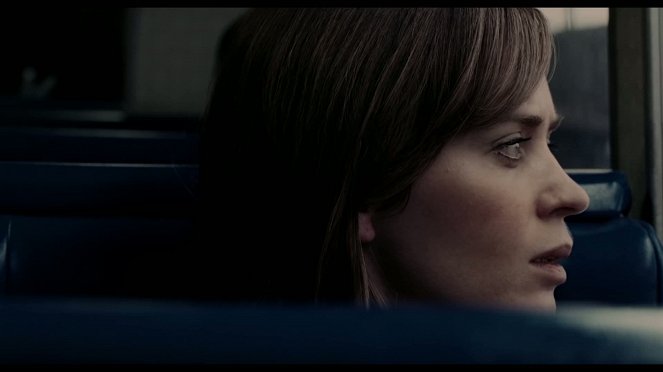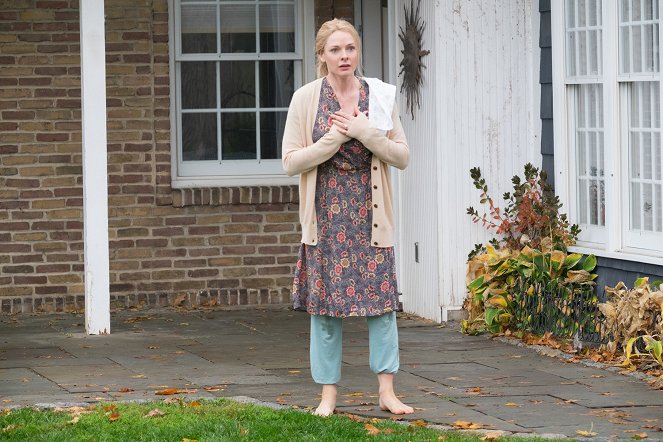Directed by:
Tate TaylorScreenplay:
Erin Cressida WilsonCinematography:
Charlotte Bruus ChristensenComposer:
Danny ElfmanCast:
Emily Blunt, Rebecca Ferguson, Haley Bennett, Justin Theroux, Luke Evans, Edgar Ramirez, Allison Janney, Lisa Kudrow, Laura Prepon, Marko Caka, Mauricio Ovalle (more)VOD (5)
Plots(1)
Rachel (Emily Blunt) is struggling. Following her divorce from Tom (Justin Theroux) her life has spiralled out of control. She’s riddled with guilt, loneliness, desperation and the need for love and connection. This leads her to obsess over the people she sees on her daily commute, fantasising about their lives and who they are. She fixates on Megan (Haley Bennett) and Scott Hipwell (Luke Evans), who live down the road from her ex and his family. (Universal Pictures UK)
(more)Videos (30)
Reviews (13)
A rare case where the adaptation perfectly copies the emotional and subjectively perceptual arc of the original, including its greatest strengths and weaknesses. It builds a perfectly constructed female triangle, pulling closer with every scene, a paranoid atmosphere where no explanation of the mystery is too far-fetched – and unfortunately, a conclusion that disappointed me as the absolute simplest and altogether black-and-white solution. Despite that, thanks to Emily Blunt, I was considering a higher rating for a long time, as she portrayed Rachel with credible emotions even in the subtlest nuances. Haley Bennett prevented me from doing so, sine despite her undeniable charms, she is too cold and cannot fully portray the idealized Megan due to her completely superfluous transparency.
()
I'm afraid that the whole phenomenon of The Girl on the Train is much more interesting than the thriller itself. However, the net product is a good female drama that shows that it is realized through a female lens. Well, why not? Actually, hip, hip, hooray. But all the PR hype, unfortunately, sells something else entirely, i.e., almost that it is a horror movie about an unstable mysterious woman who perhaps commits some crimes on a train in the moonlight or something. It would be worth analyzing if the product itself is not that good or if the promotion just doesn't believe it can sell the project without manipulation to a recipient who appreciates the topic/genre/whatever. I think it really misses the mark and that's a shame.
()
Creativity? If only! Gone Girl 2, but for a less sophisticated audience that hasn’t seen much and only knows Fincher from the train. Thanks to the novel it's based on, Girl on The Train has the potential to be a chilling and distinctive thriller, but that potential is nullified by a twist that anyone can guess halfway through the film. The other thing that doesn't work reliably is the editing and all the flashbacks and time jumping. Someone must have been under the influence of drugs, because it is very difficult for the viewer to piece together what, when, where, how, and anyway they explain it semi-literally and literally at the end, even though leaving loose ends would have been so much better. Emily Blunt gives a performance that makes you hope from the halfway point that she will take off her autumn coat, show her muscles and start doing good with a gun in her hand, but it doesn’t happen.
()
Just as when reading the novel on which The Girl on the Train is based, it is impossible to avoid comparisons with Gone Girl. Both films have noirish, bleak visual stylisation (in Fincher's case, that’s the director’s signature; in Taylor’s, it’s rather an imitation), both depict marriage as a life-threatening game filled with manipulation, lies and hypocrisies (with a cynical sense of detachment and ironic distance from the characters in Gone Girl, but in all seriousness in The Girl on the Train), and both films alternate between multiple narrators (with greater sophistication in Gone Girl). Compared to the slightly misogynistic Gone Girl, The Girl on the Train is more explicitly targeted at adult female viewers, who are encouraged through Rachel’s story to rely on themselves rather than on what they are told or what others want for them. Especially men. ___ As in the book, the final reversal of the roles of victim and offender is a tribute to the emphatic pro-woman cri de coeur, which greatly degrades the impact and sheds doubt on the meaning of the film’s portrayal of an alcoholic woman. Built more on strong acting performances than on narrative games, the film is largely conceived not as a crime thriller, but as a psychological study of an internally insecure woman in search of her lost (self-)confidence. The ending, which unlike the book contains a needless epilogue, suddenly negates this feeling of shame and guilt, intensified by the excellent Emily Blunt throughout the film. As in many of Hitchcock’s thrillers involving the transfer of guilt, the perpetrator was someone other than the film had previously indicated, which in this case, however, serves to resolve only the crime aspect of the narrative, but not the psychological dimension, which comes off as unsatisfying. ___ Thanks to the graphic continuity of the shots and precisely timed editing, Taylor succeeds in fostering the impression of fluidity and interconnectedness of the individual segments of the narrative, or rather of the individual narrators. Flashbacks showing various distant episodes from Megan’s life intensify the suspense with respect to what actually happened. Like Rachel, with her memory affected by sipping vodka, we know only fragments of reality and we have to continually add to and adjust the overall picture on the basis of new information. Like the protagonist, we also mistakenly infer who we are seeing in some of the images based on the available context. The unreliable narrative thus does not serve as the screenwriter’s calculated attempt to deceive the viewer, but is organically connected with the protagonist’s mental state and cognitive abilities. As a result, The Girl on the Train is a compact and focused film, most of whose shortcomings (the mishandled ending, lack of detachment, occasionally melodramatically forced sense of tragedy) stem from the book’s premise or are associated with the audience’s expectations (it’s not a thriller, but a drama). If you see romantic relationships as a cynical comedy that sometimes bring a smile to your face, Gone Girl will probably remain your favourite relationship movie. If you prefer a more tragic approach, The Girl on the Train may suit you better. 80%
()
(less)
(more)
At first glance, The Girl on the Train evokes Gone Girl, it depicts the issue of relationships that are extremely dysfunctional. Emily Blunt plays the role of an observant and sad alcoholic clinging to her past really well and her performance was truly convincing, as was the atmosphere and the raw authenticity of some of the scenes. However, compared Gone Girl, this film lacks some more WOW-effect at the end, something that would a chill down your spine spine; they could have gone even further, maybe. Moreover, it was clear to me from about halfway through who was responsible for the crime. In short, a film where the potential is visible, but not fully exploited.
()



Ads